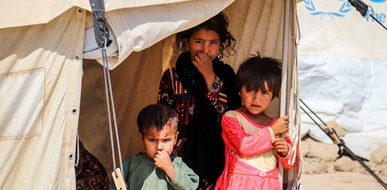[Interview] Counter-terrorism expert Rumyana van Ark: ‘All children should be considered as vulnerable’
Published 20 November 2024By Sara Urso and Audrey Nguyen

Photo: Trent Inness
In the recently published book ‘Children’s Rights, “Foreign Fighters”, Counter-Terrorism: Children of Nowhere,’ Asser senior researcher Rumyana van Ark and her co-authors call for policymakers to incorporate a more child-centric approach to counter-terrorism. 'We want to redirect the conversation away from the (potential) wrongdoing of the parents, and on to one of the most vulnerable groups in the world'. An interview.
Tell us about your book?
'The book focuses on the children of (alleged) foreign terrorist fighters who are currently still residing in camps in Syria and Iraq after the fall of the Islamic State (IS).
The plight of the children continues to be overlooked and underexplored in contrast to that of the adults when it comes to the foreign terrorist fighter phenomenon. More often than not, the children are mentioned with reference to the alleged behaviour of their parents rather than as individuals who have their own agency and who are afforded special protections under international law, namely under the United Nations (UN) Convention on the Rights of the Child. My co-authors and I strongly felt that there was a gap in the literature that had to be rectified.
The underexplored and multi-layered vulnerability of the children was at the core of our choice to adopt a children-centric approach. While the children's current predicament is partially linked to the (alleged) activities of their parents, it is also driven by the lack of sufficient care by their countries of origin or nationality in terms of supporting their return, rehabilitation and reintegration. Hence, we sought to redirect the discourse away from the parents, and on to what is one of the most vulnerable groups in the world; a group currently living in a very contained space with extremely limited basic resources.’
You worked on this book for more than 3 years. What was the most challenging and most rewarding part of the process?
‘Timing was definitely the most challenging aspect. Our original plan was to conduct in-person workshops in the United Kingdom, the Netherlands, and Australia, to capture the views from local non-governmental organisations (NGOs), regional and international organisations involved on the ground, practitioners, and legal professionals working with families stuck in the camps. However, the first lengthy COVID-19 lockdowns began across all three countries just as we were signing the book contract and making preliminary workshop plans. This meant that we had to make many adjustments and switch to virtual small group meetings, on top of balancing the other numerous impacts of lockdowns on everyday life.
As a result, it took longer than expected to complete the book. In hindsight, however, the extended timeframe of this project was probably a blessing in disguise. We had more time for deeper reflection on the subject matter and were able to incorporate new and ongoing developments. For instance, as we were still finalising the book, the European Court of Human Rights delivered its long-awaited judgement on a case against France regarding repatriation obligations, which allowed us to feature it heavily in our discussions.
Additionally, there were plenty of rewarding moments along the way. The conversations we had were incredibly insightful. From the legal representatives of the women and children hoping to return to their countries of nationality, to the NGO practitioners and security service personnel on the ground, everyone enriched our knowledge and offered additional perspectives on the camps' conditions and the plight of the children living there. They also strongly emphasised the need to make the children’s voices heard and how critical it is to advocate for the children's return home – a standpoint that truly stayed with us. It motivated us to keep ploughing through. Furthermore, it pushed us to think more pragmatically about how to convince our target audience to step out of the security lens thinking and into child-centric thinking.’
What were some of your findings from this project?
‘Our first finding is that governmental reasoning against repatriating alleged foreign terrorist fighters and their families does not hold up once you critically reflect on the available national security toolkits. For a number of Western states including the UK, the Netherlands and Australia, the core justification is not having the capacity to address the operational, security, and societal complexities that come from repatration and post-repatriation processes. A recurring question for them is, how do you publicly justify the active repatriation of someone who might pose a security threat?
However, if you look at the criminal justice frameworks in place, the immigration law frameworks, and the specific counter-terrorism measures, you see a different picture. These countries and many others have extensive and multilayered sets of measures to address individuals who engaged in terrorism activities or are suspected of doing so. Moreover, the childcare and safeguarding practitioners in states such as the Netherlands, Australia and the UK would rather have the children back, especially since they have the capacity and measures to do so; they are just waiting for the children's return.
Where states have completed repatriations, thus demonstrating that they do in fact have the operational capabilities to repatriate, a number of them have engaged in a categorisation of vulnerabilities, specifically in Europe. In other words, they have only repatriated “particularly vulnerable children”; in earlier years, it was only vulnerable orphaned children.
Within the context of the international legal framework protecting children, this is more of a publicity statement than a valid legal argument. The protections afforded by the UN Convention on the Rights of the Child clearly indicate that all children are to be considered vulnerable. They should not be subject to discrimination on any basis, and they deserve special protections compared to adults by nature of their age, and their needs in terms of support, decision-making, protection, and more.
Therefore, all children in the camps are vulnerable by virtue of being children, which makes repatriations based on subjective assessments of vulnerability a political rather than objective decision. By picking and choosing who you repatriate, you create a scale of vulnerabilities that only focuses on children at the intersection of several vulnerabilities. We argue that this is equivalent to choosing the children that are going to cause the least amount of public consternation. When repatriating orphans for example, no further explanation is required over their parents, who may pose a security threat.
Stepping into the shoes of governments, aside from the indisputable moral reasons, there are also security-oriented reasons to repatriate the children. Leaving the children behind in the squalid conditions of the camps creates ample propaganda material for terrorist organisations targeting individuals or children for radicalisation and recruitment. The message of 'look how much your own country cares about you' writes itself. Further, for children either socialised and/or radicalised into violence and violent extremism, repatriation offers the best chance of successful deradicalisation, rehabilitation and reintegration.
In the book, we also acknowledge that there may be children in some very particular familial and peer group circumstances who grow up into adults who seek a life of violence. However, that is a very, very small droplet in the sea of children that desperately need help. And if the evidence after some of the returns is any indication, returning to their home country makes a huge difference in a matter of months. The things many of us take for granted, such as easy access to clean water, heating, a solid roof and mainstream education, create positive impacts almost immediately. These factors combined with tailored reintegration programming allow many of the returned children to catch up with their peers within a year, in terms of education and societal involvement. If states genuinely want to reduce national security risks associated with alleged foreign terrorist fighters and their families, it is in their best interests to return the children home.’
What do you hope to see following the book’s release?
‘We hope to reorient the conversation towards a more child-centric approach rather than the dominant security-oriented approach. We must look beyond what is perceived as a potential and undefined future security threat and focus on the children of alleged foreign terrorist fighters. We must see them as children in desperate need of help, as rights holders who are extremely vulnerable, as individuals who deserve a life where basic necessities are not extremely scarce. In other words, we hope these children can enjoy their childhood and simply be children, instead of having to struggle daily for survival.
This is also why we make references to other European states that have made significant progress in terms of reintegration and rehabilitation, such as Kosovo. Despite being a very small and less wealthy country, Kosovo has practically repatriated everyone and successfully reintegrated most of the children. It means repatriating and reintegrating the children is possible, what we need is governments' willingness.’
Find the book here: Children’s Rights, “Foreign Fighters”, Counter-Terrorism: Children of Nowhere
About Rumyana van Ark
Dr Rumyana van Ark is a Senior researcher in international law and (counter-) terrorism at the T.M.C. Asser Instituut within the research strand ‘in the public interest: accountability of the state and the prosecution of crimes’. She is also the coordinator of all counter-terrorism related research and project activities at the T.M.C. Asser Instituut. Her research focuses on the evolving relationship between the individual (terror suspect) and the state following acts of terrorism.
Her book co-authors are Prof. Devyani Prabhat (Bristol University) and Dr. Faith Gordon (Australian National University).
Read more:
[New publication] Excessive judicial deference as rule of law backsliding: When national security and effective rights protection collide
There is growing deference of domestic and international courts to the executive in national security cases, a trend that undermines the rule of law and weakens human rights protections. With the steady rise of populism and politics of fear and division, the threat of insecurity has been hyperinflated and exploited to justify national security measures. Through an analysis of key case law, including from the European Court of Human Rights, this article explores how supranational human rights courts can counteract this erosion and argues for stronger safeguards to ensure accountability and the protection of individual rights. Read more.
[Interview] Asser researcher Rumyana van Ark: 'How the legacy of the War on Terror continues to cast a deep shadow 20 years post 9/11'
Since 9/11, the prevention and pre-emption of acts of terrorism became a priority for governments worldwide, both at domestic and international levels. This led to a transnational counter-terrorism campaign known as the ‘War on Terror’. 21 years on, counter-terrorism expert, Rumyana van Ark, investigates the legacy of this political and legal paradigm, and its implications on human rights, humanitarian law, counter-terrorism, and armed conflict. Read more.
[Interview] Counterterrorism expert Christophe Paulussen critisises citizenship stripping for terrorists and calls for evidence-based approach
In an interview with Dutch media organisation De Kanttekening, counterterrorism expert Dr Christophe Paulussen calls for a more evidence-based approach to counterterrorism policy. In the article, Paulussen reflects on plans to revoke the citizenship of convicted terrorists, according to the Coalition Agreement (‘Hoofdlijnenakkoord’) presented in May 2024. “A dangerous trend”, according to Paulussen, who calls the plans “purely symbolic politics” and “muscle-flexing rhetoric”. Read more.

